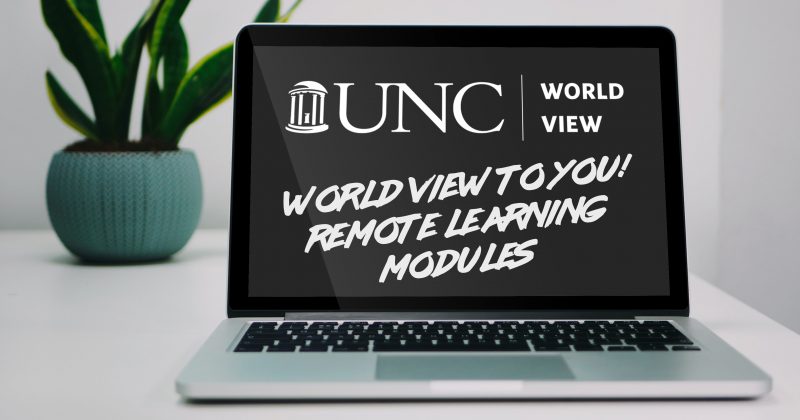
What are World View to You! Remote Learning Modules?
In the spring of 2020 World View developed several professional development opportunities for K-12 and community college educators to advance global education strategies and resources during challenging times. There are many benefits to this format.
-
Modules provide small doses of learning, done when it is convenient for YOU.
-
Minimal technology is required. A computer or device with Internet capability is necessary and in some modules you must be able to watch and listen to internet-based videos.
-
You can also CHOOSE your own pathway. World View provides content and you choose your path from the choices. Modules can be completed in ANY order!
-
Each module has a concentrated learning objective, an exploration of focused strategy or resource and requires reflection on impact or integration into your own instruction.
-
Each module has an estimated amount of time needed to complete assignments, either one, two or three hours. Choose any combination and after ten hours of assignments are completed thoroughly and turned into World View, you will be offered 1.0 Continuing Education Units. Turn assignments in one at a time or all together!
-
Can’t finish a module in one sitting? No problem, just save your work and get back to it when you are able.
-
World View will keep track of what modules you have turned in to us and how many contact hours you have accumulated. From the date of registration you will have one month to complete ten hours.
-
Limited remote learning module scholarships available for individual educators or teams of four or more educators from the same school. Please contact Julie Kinnaird (kinnaird@unc.edu) if you are interested.
Available through 2023.
Available modules:
Full modules are available for download after registration.

Exploring Populations, Climate Change and Sustainability in the Global Classroom with Photos from the OVERBook |

Recognizing Perspectives and Breaking Down Stereotypes |

Strategy for a Global Classroom: Visual Literacy Tool and Resource |
||
|
Overview: In Overdevelopment, Overpopulation, Overshoot (The OVERBook), the Population Institute uses powerful photographs to demonstrate the effects of human action on the global environment and communities around the world. This professional development module introduces strategies and resources for using photographs from the OVERBook to address issues related to climate change, consumption, human rights, nature’s rights, pollution and water in classroom instruction. Learning Objectives: Using online resources from World View and the Population Institute, educators will increase their global educator competencies by incorporating photos from the Population Institute’s OVERBook and related resources to address issues related to population, climate change, and sustainability. Approximate Completion Time: 1 hour Target Audience: K-12 and community college educators of all disciplines
|
Overview: This module raises awareness of the dangers of stereotyping and provides a web-based resource that breaks down stereotypes by showing how people live around the world. Learning Objectives: Using two free online resources educators will increase their competency as a global educator by better understanding the importance of valuing multiple perspectives and dispelling stereotypes. Approximate Completion Time: 3 hours Target Audience: K-12 and community college educators of all disciplines |
Overview: It’s a VISUAL world. Through media, we are consistently exposed to images of photographs, emojis, memes, infographics and more. Images convey not only information, but also emotion or attitude. Within a matter of seconds powerful images are understood, or at times, misunderstood. This module explores a strategy for examining images and a resource for authentic images representing everyday life around the world. Learning Objectives: Using a technique called Photo-Detectives and the resource The Everyday Projects, featuring everyday images from across the globe, educators will learn a strategy for exploring visual literacy with their students. Approximate Completion Time: 1 hour Target Audience: K-12 and community college educators of all disciplines
|
||
|
Connecting NC to the Caribbean Through a Common Experience |

Global Competency and Globalizing Your Curriculum |

Exploring Global Conflict and Peacebuilding |
||
|
Overview: Both the Caribbean and North Carolina have experienced hurricanes during the Atlantic Hurricane season. The Caribbean (also known as the West Indies) is a region southeast of the Gulf of Mexico and the North American mainland, and north of South and Central America. It has a population of over 43 million according to the 2020 United Nations estimate. North Carolina is one of the states most susceptible to hurricanes because it has a coastline that juts out into the Atlantic. Learning Objectives: In this module, you will learn about hurricanes as a mutual connection between North Carolina and the Caribbean and then consider ways to apply that connection to your teaching and learning. Approximate Completion Time: 2 hours Target Audience: K-12 and community college educators of all disciplines
|
Overview: Global Education strives to educate for global competency and identify what knowledge, skills and attitudes or values are needed in our interconnected world. Working with leading education experts and the Organisation for Economic Co-operation and Development (OECD), the Center for Global Education at Asia Society developed a framework by which students develop global competencies. Educators can use this framework to integrate content so students gain knowledge and develop skills for investigating the world, valuing multiple perspectives, communicating ideas and taking action to make a difference in the world. Learning Objectives: In this module, you will learn about the Asia Society’s framework for Global Competence. You will then review a lesson plan that you have already developed and reflect on the global dimensions that are already integrated or find areas to incorporate a global perspective. Approximate Completion Time: 2 hours Target Audience: K-12 and community college educators of all disciplines |
Overview: This module introduces resources from the Center for Preventive Action, the United States Institute of Peace and the Pulitzer Center on Crisis Reporting as well as strategies for teaching about global conflict and peacebuilding. Specific tips for addressing these topics with sensitivity and complexity will also be shared. Learning Objectives: In this module, you will learn about some resources and strategies for teaching about global conflict and peacebuilding. You will then consider some ways to apply what you’ve learned in the module to your own classroom. Approximate Completion Time: 2 hours Target Audience: K-12 and community college educators of all disciplines
|
||
|
Integrating Global Music Across the Curriculum |
|
|
||
|
Overview: This module introduces resources from the Global Jukebox, Teach Rock and Smithsonian Folkways, as well as strategies for teaching about global music across the curriculum. Learning Objectives: In this module, you will learn about some resources and strategies for integrating global music into the classroom. You will then consider some ways to apply what you’ve learned in the module to your own classroom. Approximate Completion Time: 3 hours Target Audience: K-12 and community college educators of all disciplines
|
|
Have questions or want to learn more?
Please contact worldview@unc.edu.
Ready to begin?
Register first through the registration link on this page. After you’ve received your password, navigate to this page or follow the link in your registration confirmation. Please download the PDFs and save them to your computer before completing them.


